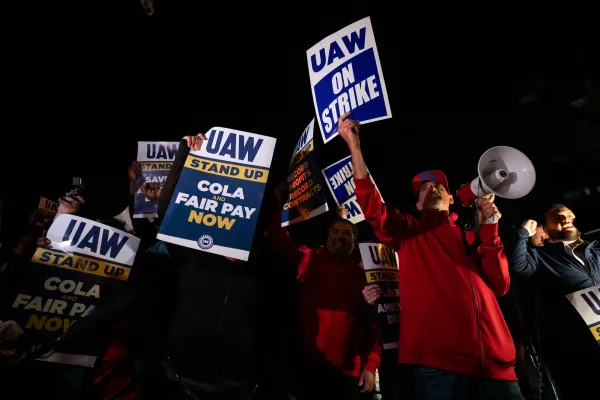Since Friday, an indefinite strike initiated by the United Auto Workers (UAW) union has severely impacted the operations of top US automakers. On September 15, the UAW launched the protest at three major US auto plants after failing to reach agreements on new contracts. This marks the first-ever labor action against the Detroit three automakers, comprising General Motors, Ford Motor, and Stellantis, the parent company of Chrysler.
The strike comes amid a broader industry trend where automakers, both in the US and globally, are intensely focused on cost reductions, including job cuts, to accelerate the transition from gasoline-powered vehicles to electric vehicles (EVs).
UAW’s Negotiations:
The UAW, representing 46,000 GM workers, 57,000 Ford employees, and 43,000 Stellantis workers, initiated negotiations with these companies in July. Historically, contract talks between the UAW and the Detroit automakers have often extended beyond the strike deadline.
The UAW’s previous contracts with General Motors, Ford Motor, and Stellantis expired on Thursday, prompting the labor action.
Detroit Automakers’ Wage Offers:
In their negotiations, the automakers have proposed significant wage increases, including a 20% raise over a four-and-a-half-year contract term, with an immediate 10% hike. The automakers contend that these proposals equate to a cumulative 21% increase over the contract duration.
UAW’s Response:
However, the union has rejected these offers, demanding a more substantial 40% wage hike, which includes a 20% immediate increase, along with improvements in benefits.
UAW’s Key Demands:
The UAW is pressing the automakers to eliminate the two-tier wage system, where new hires earn significantly less than veteran workers. They are also seeking substantial salary increases, given the automakers’ financial success, while highlighting generous executive compensation and federal subsidies for EV sales.
The union’s demands include restoring defined benefit pensions for all workers, shorter 32-hour work weeks, cost-of-living increases, job security guarantees, and an end to the use of temporary workers. Moreover, the UAW has expressed concerns about the industry’s shift to EVs and has called on the Biden administration to revise proposed vehicle emission cuts.
Automakers’ Goals:
The Detroit Three automakers aim to narrow the cost gap they face compared to foreign automakers with non-unionized US factories. They are also seeking greater flexibility in utilizing their US workforces to enhance efficiency and reduce costs during the transition to EVs.
Stakes Involved:
A full strike would have significant financial repercussions, potentially costing each affected automaker approximately $400 million to $500 million per week if all production were halted. This could also impact quarterly profits for auto part suppliers. According to an analysis by the Anderson Economic Group, a 10-day strike by the UAW could result in more than $5 billion in losses for manufacturers, workers, suppliers, and dealers.
The ongoing strike underscores the critical role of labor negotiations in shaping the future of the US automotive industry as it undergoes a transformative shift toward electric vehicles.
